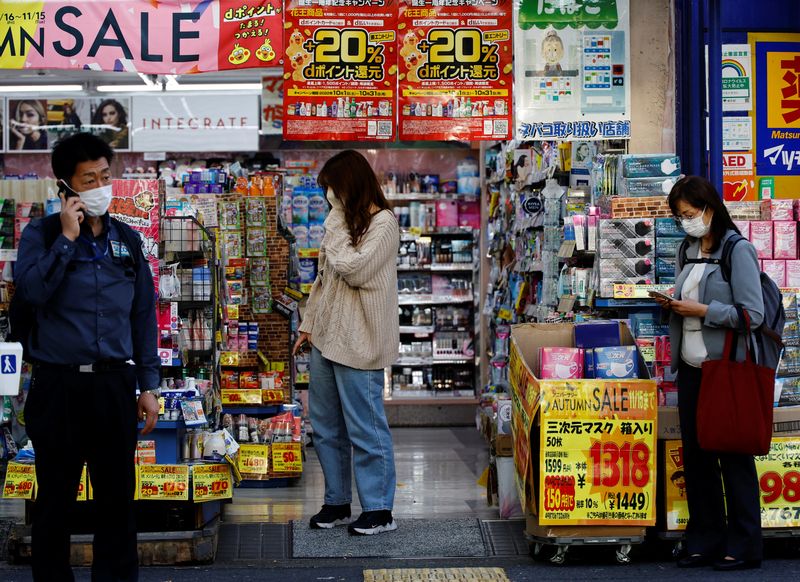By Takahiko Wada and Leika Kihara
TOKYO (Reuters) - Core consumer prices in Japan's capital, a leading indicator of nationwide trends, rose at their fastest annual pace in 40 years in November and exceeded the central bank's 2% target for a sixth straight month, signalling broadening inflationary pressure.
The increase, driven mostly by food and fuel bills but spreading to a broader range of goods, cast doubt on the view of the Bank of Japan (BOJ) that recent cost-push inflation will prove transitory, some analysts said.
The Tokyo core consumer price index (CPI), which excludes fresh food but includes fuel, was 3.6% higher in November than a year earlier, government data showed on Friday. The rise exceeded a median market forecast of 3.5% and the 3.4% increase seen in October
The last time Tokyo inflation was faster was April 1982, when the core CPI was 4.2% higher than a year before.
While the rise was driven mostly by electricity bills and food prices, companies were also charging more for durable goods as the weak yen pushed up the cost of imports, the data showed.
"Price hikes are broadening and suggests the weak yen could keep inflation elevated well into next year," said Mari Iwashita, chief market economist at Daiwa Securities.
"Core consumer inflation may stay around the BOJ's 2% target for much of next year, which would make it hard for the bank to keep arguing that the price rises are temporary."
The Tokyo core-core CPI index, which excludes fuel as well as fresh food, was 2.5% higher in November than a year earlier, picking up from the 2.2% annual gain seen in October.
BOJ AN OUTLIER
The BOJ has kept interest rates ultra-low on the view that inflation will slow back below its target next year when the boost from fuel price gains dissipate. The central bank has therefore remained an outlier from a wave monetary tightening around the world aimed at combating soaring inflation.
Contrary to the experience of some western economies, where wages have surged with inflation, growth in wages and services prices remain muted in Japan.
Of the components making up the Tokyo CPI data, services prices in November were up just 0.7% on a year earlier, after a 0.8% annual increase seen in October. That compared with a 7.7% spike in durable goods prices for November, which followed October's 7.0% annual gain.
Separate data released by the BOJ on Friday showed the corporate service price index, which measures prices that firms charge each other for services, had been 1.8% higher in October than a year earlier. That was slower than a 2.1% annual gain seen in September.
BOJ Governor Haruhiko Kuroda has repeatedly said that, for inflation to sustainably hit his 2% inflation target, wages must rise enough to offset the rise in goods prices.

Slow wage growth has been among factors delaying Japan's recovery from the coronavirus pandemic. The world's third-largest economy unexpectedly shrank an annualised 1.2% in the third quarter, partly because of soft consumption.
The Tokyo CPI data heightens the chance of further rises in nationwide core consumer prices, which in October were 3.6% higher than a year earlier, also marking a 40-year high. The nationwide data for November is scheduled for release on Dec. 23.
